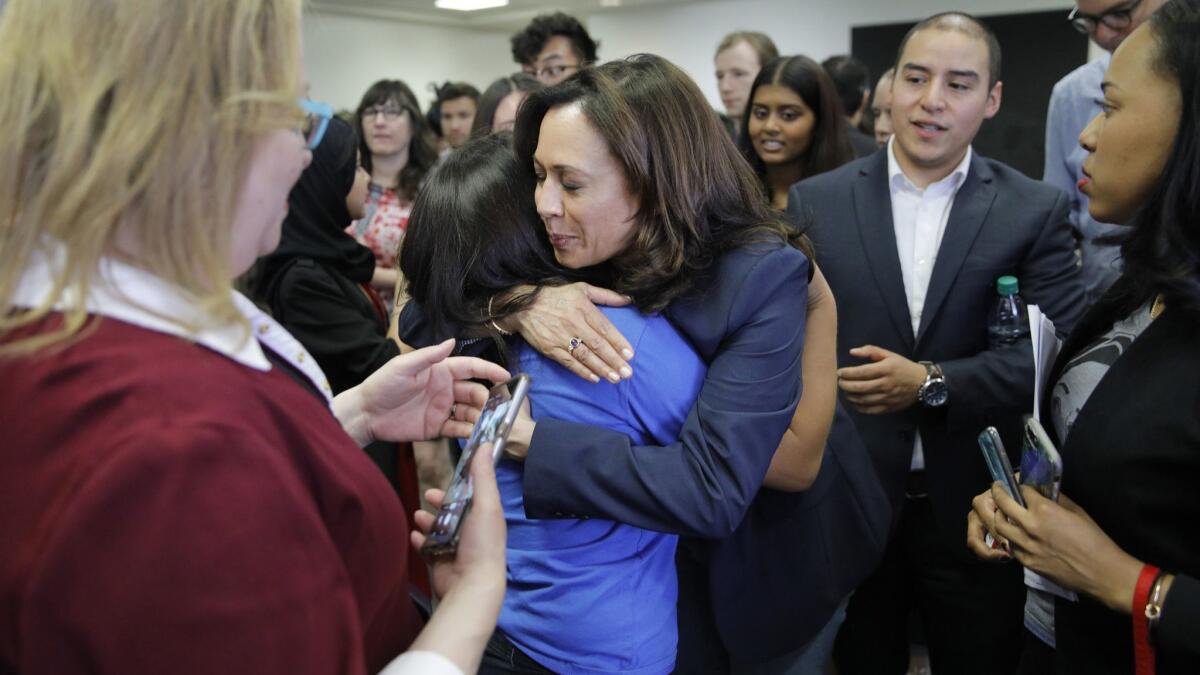Democrats favor immigration, which is why they should stop stumping for open borders

- Share via
The most important moment in the Democratic debates didn’t come in response to questions about healthcare, income inequality or caged children without enough to eat. It was when Sen. Kamala Harris, widely considered the winner of the two-night spectacle, answered Telemundo reporter Jose Diaz-Balart’s question about deporting people who are in the U.S. illegally but have committed no other offense. Harris, who clearly welcomed the question, immediately and vehemently responded: “Absolutely not, they should not be deported.”
Not a single candidate contradicted her, yet a different answer should have been a no-brainer: “Yes, unless they have a valid asylum claim or some other special claim to remain.”
For advocates of immigration, Harris’ unequivocal response is self-defeating. It ignores perhaps the key fact about U.S. immigration politics and policy: Most Americans will accept more legal immigrants only if they believe that we can effectively limit illegal ones.
This is why “secure borders” is a mantra of immigration politics, one to which Democratic leaders have always subscribed until the debates, when “secure borders” was hardly mentioned. Ignoring what voters want on this issue is a huge political gift to our shameless president and Republican candidates generally, one that will keep on giving as Harris is made to defend her words and as her fellow candidates scramble under public pressure to distance themselves from her position.
Ignoring what voters want on this issue is a huge political gift to our shameless president and Republican candidates generally.
Democrats can and should champion a liberal immigration policy. Legal immigration quotas should be expanded well beyond the current level of approximately 1 million a year, which represents a far lower proportion of our population than the number of legal immigrants whom Canada and traditionally homogeneous Sweden admit annually. If immigrants possess needed skills, our economy will benefit. If they speak or will learn English and obey the laws, they will assimilate. If young, they can also improve our declining fertility rate and help fund our growing entitlement programs. Today, all of this is true of our legal immigrants. (It is less true of our undocumented ones.)
Nor would this position amount to throwing the undocumented under the bus. It isn’t at odds with favoring a generous legalization policy, including at a minimum DACA eligibles and their parents. Many Republicans would also support this as an element of more comprehensive reform. Even President Trump once claimed to favor this, but reneged.
In addition, a nearly century-old provision in immigration law, known as registry, makes any long-term, continually resident undocumented immigrant who can demonstrate good moral character eligible for a green card. The current provision requires entry before 1972, a date set in 1986; updating it to, say, 2000 or later is a long overdue reform.
Harris and her fellow candidates seem to be ignorant of these facts, and equally ignorant of our refugee/asylum statute, which since 1980 has provided admission to undocumented entrants who can show a “well-founded fear of persecution” on a variety of grounds; in 2018, 30% of applicants succeeded. One ground is “membership in a particular social group.” It is debatable whether this should be interpreted broadly to protect those who fear gang violence in Central America’s northern triangle. But granting asylum to the countless number now at our border whose only claim appears to be abject poverty would go far beyond human rights law and undermine its workability.
Enter the Fray: First takes on the news of the minute »
We may also debate whether immigrants without legal status should face criminal sanctions, as the Trump administration has increasingly done, or just the civil penalties that are the norm.
Among the Democratic debaters, only Colorado Sen. Michael Bennet seemed to support the threat of criminal sanctions, presumably because they more strongly deter illegal entry. All of the candidates on the debate stage wanted to restore foreign aid for social services in the main migrant-source countries, but that wouldn’t reduce the surge at the border quickly or perhaps at all.
Americans are justly proud of our immigrant past and present — and almost every politician, Democrat or Republican, duly pays lip service to this truth. But leading Democrats who have previously insisted that they oppose open borders seem to be inviting that very outcome.
This is political suicide. All but a handful of Americans strongly believe in maintaining our national sovereignty. By categorically and emphatically rejecting the deportation of any noncriminal undocumented person who manages to get inside the country, Harris and others threaten this sovereignty at its core.
Democrats and other immigration supporters should swiftly repudiate this unforced error.
Peter H. Schuck, an emeritus professor of law at Yale University and scholar-in-residence at New York University, is author most recently of “One Nation Undecided: Clear Thinking About Five Issues That Divide Us.”
Follow the Opinion section on Twitter @latimesopinion and Facebook
More to Read
A cure for the common opinion
Get thought-provoking perspectives with our weekly newsletter.
You may occasionally receive promotional content from the Los Angeles Times.









